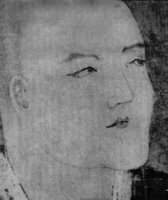#5: Dogen

When I was thinking about my list of seven spiritual characters, I had tough time in choosing between Dogen and Bodhidharma. They are both famous Zen figures who differed from each other like a night and day. Dogen was good with words, profound talker and excellent writer. Bodhidharma, on the other hand, never wrote anything, was highly anti-social and could grumble even to the emperor. In the end I picked Dogen to my list, but they (and many other Zen figures) are both highly worth of knowing.
I became familiar with Zen (as a word) when once I was making a quick visit to bookshop, looking for something to read for a train trip. There I saw a book called “Zen” by Alan Watts. I picked it up and browsed it a bit. It looked just what I had already been encountering at that time so of course I bought it. Zen is something very pure. I would not call it religion - in fact I would not put any name or any classification on it. Its historical roots are in Buddhism but one could also say that it has always been here.
Dogen was relentless searcher of a truth. He realized the impermanence of all things very early as his mother died when he was just eight years old. He was not happy about the state of spirituality in his land. It had happened what always happens, religion becomes merely a custom. Words had become more important than what they represent (To point at the moon a finger is needed, but woe to those who take finger for the moon.). There were lots of temples full of rituals, ceremonies and chanting of sutras but Dogen knew that all such was just missing the point altogether. Later on when Dogen was on his journey in
Here are two great quotes from Dogen:
To study the Buddha Dharma is to study the self
To study the self is to forget the self
To forget the self is to be enlightened by all things.
The great way of the buddhas is profound, wondrous, inconceivable; how could its practice be easy? Have you not seen how the ancients gave up their bodies and lives, abandoned their countries, cities, and families, looking upon them as like shards of tile? After that they passed eons living alone in the mountains and forests, bodies and minds like dead trees; only then did they unite with the way. Then they could use mountains and rivers for words, raise the wind and rain for a tongue, and explain the great void…


0 Comments:
Post a Comment
<< Home